[This is article has now been cross-published by Salon...]
 The man who wrote Arizona's "Papers Please" law before running for Kansas Secretary of State in 2010 on the premise of stamping out "voter fraud" there ... before winning and subsequently not being able to find much, if any of it, at all, is nonetheless still at work attempting to keep legitimate voters from being able to cast their vote under the premise that thousands of non-citizens are somehow, secretly, illegally voting in the state of Kansas.
The man who wrote Arizona's "Papers Please" law before running for Kansas Secretary of State in 2010 on the premise of stamping out "voter fraud" there ... before winning and subsequently not being able to find much, if any of it, at all, is nonetheless still at work attempting to keep legitimate voters from being able to cast their vote under the premise that thousands of non-citizens are somehow, secretly, illegally voting in the state of Kansas.
"In Kansas, the illegal registration of alien voters has become pervasive," Kris Kobach's personal website still reads today. He just can't seem to find any.
Despite that annoying little truth, he now has a new plan to try and keep those "alien voters" from voting, even if it involves keeping 17,500 or more perfectly legal U.S. citizen residents of Kansas from voting as well...
Last month, we explained how Kobach's new law, requiring proof of citizenship in order to register Kansans to vote, had left more than 15,000 otherwise legal voters in limbo.
Voters who had registered to vote using the federal registration form --- as mandated by the National Voter Registration Act of 1993 (NVRA or "Motor Voter Act", since it requires local government facilities, such as DMVs, to provide a nationally standardized voter registration form) --- are now being blocked by Kobach from voting in KS, unless they have been able to prove their citizenship to the satisfaction of a new state law written by Kobach and passed by state Republicans last year.
That new proof-of-citizenship law took affect at the beginning of this year and has resulted in thousands of previously legal voters becoming "suspended" until such time as they present documentation to prove they are citizens. The burden is now on them to prove they are innocent, rather than on the state to prove they have broken any laws. If they don't, according to Kobach, they will not be allowed their right to vote.
Over the summer, however, the U.S. Supreme Court struck down the portion of Arizona's version of the law, where they were similarly attempting to keep voters who used the national registration form from being able to vote unless they later provided proof of citizenship. The national form requires registrants to sign an oath, under penalty of perjury, attesting that they are U.S. citizens, but it does not require actual documentation, as required under the AZ and KS laws.
The Court determined that barring voters under such state laws is unconstitutional, but found that AZ has a right to petition the U.S. Election Assistance Commission (EAC) to add that requirement to the federal form, if they like. Until then, however, states cannot deny voters the right to vote simply because they used the federal form to register.
Arizona and Kansas are now in court, attempting to require the EAC to add that requirement. But Kobach is reportedly laying the groundwork for what to do if he loses that court case.
According to the Wichita Eagle --- which pegs the number of currently "suspended", but otherwise legal voters at 17,500 --- Kobach's plan involves creating several different classes of voters: some who can vote in all elections, others who can vote in only federal contests, and still others who will not be allowed to vote at all...
• Voters using either the federal or Kansas form and providing state-required documents proving their citizenship would be able to vote in all federal, state and local elections.
• Voters who use the federal form but don’t provide citizenship documents will be allowed to vote only for candidates running for president, vice president and Congress.
• Registrants who file a Kansas form but don’t provide citizenship documents will be put in suspension and won’t be allowed to vote in any election.
As the Eagle notes, "The citizenship requirement is separate from Kansas’ requirement that voters provide photo ID at the polls. While most people use their driver’s license for that, it’s generally not sufficient proof to register to vote in Kansas."
Kobach's interpretation of the SCOTUS ruling, that he may legally create different tiers of access for voters, barring some from voting in state and local elections, is itself questionable, but has some basis in Constitutional authority.
"The federal government doesn’t have the authority to tell Kansas what to do in Kansas elections," according to Kobach's legal analysis of the Supreme Court's decision in the Arizona case. His argument likely rests on Article 1 of the U.S. Constitution, allowing state legislatures to determine "The Times, Places and Manner of holding Elections for Senators and Representatives." Generally, federal election laws, such as the Help America Vote Act of 2002 (HAVA) have mandated requirements for federal elections, but have left states to otherwise determine the way non-federal elections are run.
"That, too, will probably have to be decided by a court," says the Eagle, which notes that the ACLU "has notified Kobach that it intends to sue in mid-November if he doesn’t stop suspending voters for not filing citizenship papers." The civil rights group charges Kobach is defying the Supreme Court by creating "unnecessary bureaucratic hurdles (that) have deprived thousands of Kansans of their right to register to vote."
Election officials are also concerned about the additional problems Kobach's two-tier voter plan will cause them, in the event that the state loses the current case against the EAC and the plan for two different classes of voters is implemented. They worry they will then have to prepare two different sets of ballots for use in each election, for each of the two classes of voters allowed to vote. One ballot with all races, and another with only federal races.
"It would be a nightmare for us," says Sherman County Clerk Janet Rumpel, the immediate past President of the Kansas County Clerks and Election Officials Association.
 Despite his complete inability, since coming to office in 2011, to demonstrate the "pervasive" illegal voting that he claims he was running to stop, Kobach, a hard Rightwing Tea Party favorite, seems unconcerned by either the thousands of his own constituents who he's prepared to keep from voting at all, or the difficulty new voters in Kansas now face in attempting to become enfranchised.
Despite his complete inability, since coming to office in 2011, to demonstrate the "pervasive" illegal voting that he claims he was running to stop, Kobach, a hard Rightwing Tea Party favorite, seems unconcerned by either the thousands of his own constituents who he's prepared to keep from voting at all, or the difficulty new voters in Kansas now face in attempting to become enfranchised.
The Eagle reports that since the proof-of-citizenship law took effect on January 1, "voting registration drives ground to a halt because of the impracticality of getting the needed documents to complete the process."
Opponents of the law, like Democratic Rep. Jim Ward, who told the paper that he registers about 400 voters "as he walks his precincts each election," hopes to be able to use the federal form in the future instead.
Ward says he once asked Kobach how voter registration workers should collect the documentation now needed to register under the new law.
"Carry a copy machine with you," he claims the Sec. of State told him. "It was a snarky response, but I think it tells you his attitude toward the right to vote."
UPDATE 10:51am PT: Imagine that. Arizona's Attorney General Tom Horne has also decided to interpret the U.S. Supreme Court's ruling exactly as Kobach has in Kansas, according to Laurie Roberts at AZCentral. Horen has announced plans to create two different classes of voters in the Grand Canyon State: those who can vote in state and local elections, and second class voters who can only vote for President, Vice President and members of Congress...


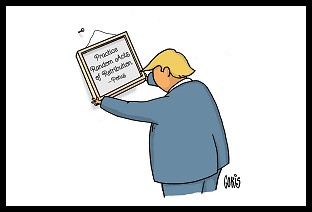 Sunday 'Random Acts of' Toons
Sunday 'Random Acts of' Toons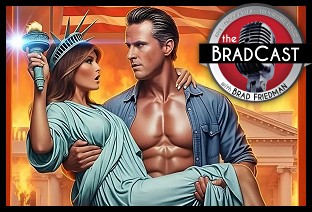 From CA's 'Nuclear Deterrence' Map to Newsom's Trolling to Trump's 'Fascist Theatre' and Beyond: 'BradCast' 8/21/25
From CA's 'Nuclear Deterrence' Map to Newsom's Trolling to Trump's 'Fascist Theatre' and Beyond: 'BradCast' 8/21/25 'Green News Report' 8/21/25
'Green News Report' 8/21/25
 On 'Americanism' and Trump's 'Stalinesque' Plot to Whitewash U.S. History: 'BradCast' 8/20/25
On 'Americanism' and Trump's 'Stalinesque' Plot to Whitewash U.S. History: 'BradCast' 8/20/25 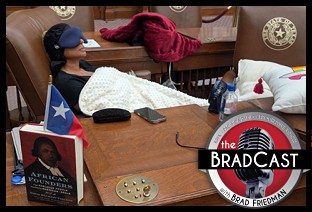 Texas GOP Imprisons Dem State Lawmaker in State House Chamber: 'BradCast' 8/19/25
Texas GOP Imprisons Dem State Lawmaker in State House Chamber: 'BradCast' 8/19/25 'Green News Report' 8/19/25
'Green News Report' 8/19/25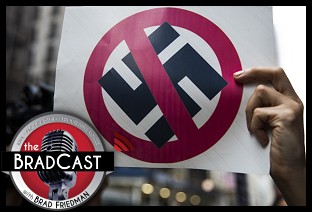 Trump, Nazis and
Trump, Nazis and 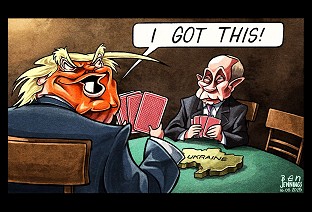 Sunday '
Sunday ' Newsom's 'Election Rigging Response Act'; FCC's License Renewal for Sock-Puppeting Sinclair: 'BradCast' 8/14/25
Newsom's 'Election Rigging Response Act'; FCC's License Renewal for Sock-Puppeting Sinclair: 'BradCast' 8/14/25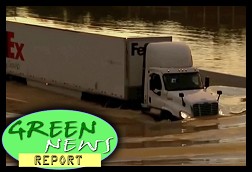 'Green News Report' 8/14/25
'Green News Report' 8/14/25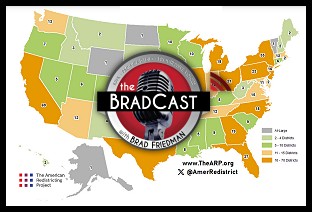 140 New House Reps?: Moving Beyond the Gerrymandering Wars: 'BradCast' 8/13/25
140 New House Reps?: Moving Beyond the Gerrymandering Wars: 'BradCast' 8/13/25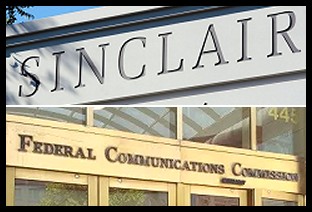 FCC Renews Sinclair TV Licenses Despite Complaint from Petitioner Who Died Waiting
FCC Renews Sinclair TV Licenses Despite Complaint from Petitioner Who Died Waiting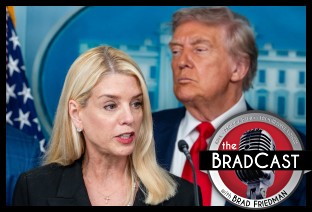 It's Not About the Rule of Law, It's About Authoritarian Control: 'BradCast' 8/12/25
It's Not About the Rule of Law, It's About Authoritarian Control: 'BradCast' 8/12/25 'Green News Report' 8/12/25
'Green News Report' 8/12/25 After Vaccine Cancels, CDC Shooting, Former Officials Want RFK Out: 'BradCast' 8/11/25
After Vaccine Cancels, CDC Shooting, Former Officials Want RFK Out: 'BradCast' 8/11/25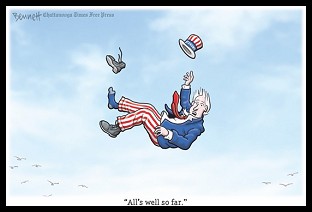 Sunday 'All's Well' Toons
Sunday 'All's Well' Toons 'Green News Report' 8/7/25
'Green News Report' 8/7/25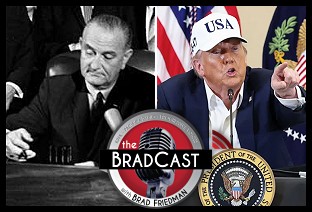 Trump Wars Against Greem Energy, Democracy on VRA's 60th: 'BradCast' 8/7
Trump Wars Against Greem Energy, Democracy on VRA's 60th: 'BradCast' 8/7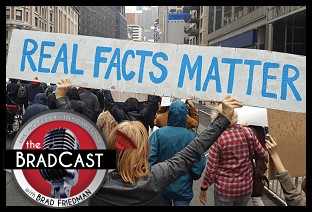 Media Conglomerates Continue Trump Capitulation: 'BradCast' 8/6/25
Media Conglomerates Continue Trump Capitulation: 'BradCast' 8/6/25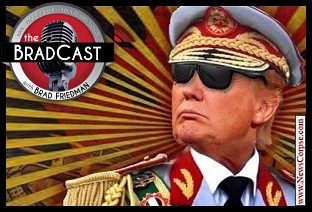 Banana Republican: Trump Shoots the Labor Statistics Messenger: 'BradCast' 8/5/25
Banana Republican: Trump Shoots the Labor Statistics Messenger: 'BradCast' 8/5/25 All's Fair in Love, War and, Apparently, Part-isan Gerrymandering: 'BradCast' 8/4/25
All's Fair in Love, War and, Apparently, Part-isan Gerrymandering: 'BradCast' 8/4/25 The Art of the Corrupt, Phony, Unlawful, Pretend Trade Deal: 'BradCast' 7/31/25
The Art of the Corrupt, Phony, Unlawful, Pretend Trade Deal: 'BradCast' 7/31/25 Battle Begins Against Trump EPA Climate Regulations 'Kill Shot': 'BradCast' 7/30/25
Battle Begins Against Trump EPA Climate Regulations 'Kill Shot': 'BradCast' 7/30/25 A Pu Pu Platter of Trump Corruption: 'BradCast' 7/29/25
A Pu Pu Platter of Trump Corruption: 'BradCast' 7/29/25 'Catastrophic' GOP Cuts to Medicaid, Medicare, ACA: 'BradCast' 7/28/25
'Catastrophic' GOP Cuts to Medicaid, Medicare, ACA: 'BradCast' 7/28/25
 VA GOP VOTER REG FRAUDSTER OFF HOOK
VA GOP VOTER REG FRAUDSTER OFF HOOK Criminal GOP Voter Registration Fraud Probe Expanding in VA
Criminal GOP Voter Registration Fraud Probe Expanding in VA DOJ PROBE SOUGHT AFTER VA ARREST
DOJ PROBE SOUGHT AFTER VA ARREST Arrest in VA: GOP Voter Reg Scandal Widens
Arrest in VA: GOP Voter Reg Scandal Widens ALL TOGETHER: ROVE, SPROUL, KOCHS, RNC
ALL TOGETHER: ROVE, SPROUL, KOCHS, RNC LATimes: RNC's 'Fired' Sproul Working for Repubs in 'as Many as 30 States'
LATimes: RNC's 'Fired' Sproul Working for Repubs in 'as Many as 30 States' 'Fired' Sproul Group 'Cloned', Still Working for Republicans in At Least 10 States
'Fired' Sproul Group 'Cloned', Still Working for Republicans in At Least 10 States FINALLY: FOX ON GOP REG FRAUD SCANDAL
FINALLY: FOX ON GOP REG FRAUD SCANDAL COLORADO FOLLOWS FLORIDA WITH GOP CRIMINAL INVESTIGATION
COLORADO FOLLOWS FLORIDA WITH GOP CRIMINAL INVESTIGATION CRIMINAL PROBE LAUNCHED INTO GOP VOTER REGISTRATION FRAUD SCANDAL IN FL
CRIMINAL PROBE LAUNCHED INTO GOP VOTER REGISTRATION FRAUD SCANDAL IN FL Brad Breaks PA Photo ID & GOP Registration Fraud Scandal News on Hartmann TV
Brad Breaks PA Photo ID & GOP Registration Fraud Scandal News on Hartmann TV  CAUGHT ON TAPE: COORDINATED NATIONWIDE GOP VOTER REG SCAM
CAUGHT ON TAPE: COORDINATED NATIONWIDE GOP VOTER REG SCAM CRIMINAL ELECTION FRAUD COMPLAINT FILED AGAINST GOP 'FRAUD' FIRM
CRIMINAL ELECTION FRAUD COMPLAINT FILED AGAINST GOP 'FRAUD' FIRM RICK SCOTT GETS ROLLED IN GOP REGISTRATION FRAUD SCANDAL
RICK SCOTT GETS ROLLED IN GOP REGISTRATION FRAUD SCANDAL VIDEO: Brad Breaks GOP Reg Fraud Scandal on Hartmann TV
VIDEO: Brad Breaks GOP Reg Fraud Scandal on Hartmann TV RNC FIRES NATIONAL VOTER REGISTRATION FIRM FOR FRAUD
RNC FIRES NATIONAL VOTER REGISTRATION FIRM FOR FRAUD EXCLUSIVE: Intvw w/ FL Official Who First Discovered GOP Reg Fraud
EXCLUSIVE: Intvw w/ FL Official Who First Discovered GOP Reg Fraud GOP REGISTRATION FRAUD FOUND IN FL
GOP REGISTRATION FRAUD FOUND IN FL

































